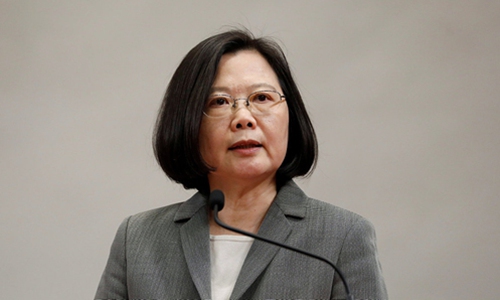HOME >> OPINION
Mainland will thwart Taiwan’s bid for secession
By Yin Maoxiang and Zhang Hua Source:Global Times Published: 2020/1/16 19:38:40

Photo:VCG
US role has been central in getting Tsai Ing-wen re-elected in Taiwan regional leadership elections on Saturday. Her re-election will significantly impact future China-US relations. It is foreseeable that US-Taiwan ties will see a marked improvement and Washington is going to play the "Taiwan card" more actively, which will intensify the strategic competition between China and the US over the Taiwan question.Bluntly intervening in the Taiwan leadership elections, US spared no effort to help Tsai win. In June 2019, both Cory Gardner, chairman of the Senate Foreign Relations Subcommittee on East Asia, the Pacific, and International Cybersecurity Policy, and William Brent Christensen, director of Taipei office of the American Institute in Taiwan, accompanied Tsai to visit Taipei's Dadaocheng area, which was just like canvassing for her.
In 2019, the US also upgraded arms sale to Taiwan, including approving selling 66 F16 fighter jets to the island. Tsai's administration took this chance to vociferously hype up close relations with the US.
As soon as the results of the election were announced, US Secretary of State Mike Pompeo congratulated Tsai, and Christensen also met her on January 12.
Many analysts believe that the island's election is a contest of influence between the Chinese mainland and the US. They argue that the US publicly supports Tsai to secure its control of Taiwan and ensure that the island can continue to play a role in checking the Chinese mainland. Predictably, for a long time, the strategic competition between China and the US will not end, but keep escalating.
As the core issue in China-US relations, the Taiwan question has long been considered a trump card by Washington to gain leverage over Beijing. As long as the island is led by a completely pro-US leader, Washington can always exploit the Taiwan card.
Compared with Tsai, Han Kuo-yu, the Kuomintang candidate, is more independent and concerned about Taiwan's future from the perspective of Taiwan's interests rather than that of the US. Hence, the White House won't allow him to be Taiwan leader.
While the US intervened in the elections, the Chinese mainland has been following the principle of non-interference in the affairs of Taiwan. The mainland is committed to the one-China principle, opposing "Taiwan secession," deepening cross-Straits economic integration and development, and promoting peaceful reunification of the country. The mainland doesn't care much about who is the Taiwan leader, but pays more attention to the leader's cross-Straits policy.
As she declared victory in Taipei, Tsai said cross-Straits relations should be based on "peace, parity, democracy and dialogue." Although the words sound benign, they harbor implications of "Taiwan secession" and a sense of confrontation.
"Peace" is good, but not all wars are unjust. Wars to achieve national reunification and defend territorial integrity are righteous. Tsai's attempts to prevent the Chinese mainland from safeguarding its sovereignty under the banner of peace will prove futile. In Tsai's dictionary, "parity" is a synonym of "Taiwan secession." Taiwan is a part of China and it cannot be placed on an equal footing with China.
With "democracy," Tsai implies the different values across the Straits to reject reunification. "Dialogue" is the right way to resolve divergence, but there is a precondition for dialogue between the mainland and Taiwan - the mainland will not hold dialogues with secessionists. Cross-Straits dialogues must be conducted under the premise that Taiwan adheres to the 1992 consensus.
In the future, if Tsai continues to advocate "Taiwan secession" activities, challenge the Chinese mainland, and deepen ties with the US by serving as Washington's pawn, the situation across the Taiwan Strait will deteriorate substantially. I believe that the Chinese mainland, with a strong economy and military power, will take any possible measure to strongly resist and respond to any action of Washington and Taiwan that endangers peace across the Taiwan Strait.
Yin Maoxiang is a PhD candidate at the School of International Studies, Renmin University of China. Zhang Hua is an associate research fellow of the Institute of Taiwan Studies, Chinese Academy of Social Sciences. opinion@globaltimes.com.cn
Posted in: VIEWPOINT